|
|

 |
The Road to 1945 Paul Addison Addison's book is credited with starting the discussion on a Post-War Consensus. 'The national unity of the war years gave rise to a new consensus at the top which dominated Britain long after the last bomb had fallen'. In effect a new consensus between the political elite with Labour's Attlee government continuing the work started by the wartime coalition of all the parties.
|
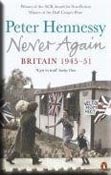 |
Never Again by Peter Hennessy Hennessey is another historian who believes that the post-war consensus was developed due to the experience of WW2. Postwar Britain could not be understood without understanding the transformative effect of the war itself in shaping the economics and politics for the next three decade and forming 'the post war settlement.'
|
 |
Britain Since 1945: The People's Peace by Kenneth Morgan Morgan also accepts the Consensus period but created a three stage way of looking at the post-war period: Era of advance 45 - 61, Years of retreat 61 - 79, Storm and stress 79 - 89 
|
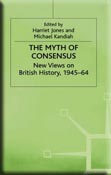 |
The Myth of Consensus: New Views on British History, 1945-64 Edited by Harriet Jones This book gives examples of revisionist historians who believe that conflict and class divisions were alive and well in the post war period. Of particular interest is Noel Whiteside's 'Industrial relations and the politics of the social wage 1945 - 60. He cites the frequency and passions behind the strikes in this period and the divide between the managers and the shop floor workers.
|
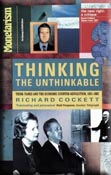 |
Thinking the Unthinkable: Think-tanks and the Economic Counter-revolution, 1931-83 by Richard Cockett Cockett believed that pro-capitalist intellectual ideas born out of Cold War rivarly and in the failing 1970s economic models were the key to ending the post-war consensus and ushering in Monetarism and Thatcherism in the 1980s. The most important thinker being Friedrich Hayek.
|
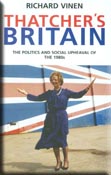 |
Thatcher's Britain: The Politics and Social
Upheaval of the 1980s by Richard Vinen Vinen believed that Thatcher was more pragmatic and less dogmatic. He believed that it was only after the three events of the Falklands War, the Miner's Strike and the 1983 election success that she fully began her radical Thatcherism.
|
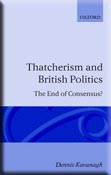 |
Thatcherism and British Politics: The End of Consensus by Dennis Kavanagh Kavanagh believed that Margaret Thatcher was frustrated by the Conservatives of the consensus generation and wanted to strike out a new direction for her party and to destroy consensus politics once and for all.
|
Back to OIB
Armed Forces | Art and Culture | Articles | Biographies | Colonies | Discussion | Glossary | Home | Library | Links | Map Room | Sources and Media | Science and Technology | Search | Student Zone | Timelines | TV & Film | Wargames